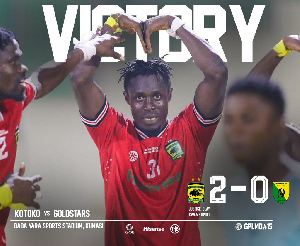LONDON, Oct 11 (Reuters) - Lonmin Plc said on Monday it had made a conditional offer for Ashanti Goldfields Co Ltd, valuing the troubled Ghanaian mining company at $784 million.
The all-share deal, worth $7 per share at Friday's close, would create one of the world's top five precious metal producers with annual output of some two million ounces of gold and one million ounces of platinum group metals, analysts said.
But it is dependent on Ashanti's hedge book counterparties agreeing to a standstill on hundreds of million of dollars of margin calls which they are entitled too after the company was caught out by a sharp rise in gold prices.
Lonmin -- the mining rump of Tiny Rowland's former trading empire, Lonrho Plc -- plans to offer 32 new shares for every 43 Ashanti shares shares it does not currently own.
Shares in Lonmin, which already owns 32 percent of Ashanti, rose 11 pence or two percent to 581p as investors took the view it would be acquiring Ashanti at a good price.
``It's potentially a very good deal, as long as the hedge book problems don't spill over into the new entity,'' commented one mining analyst at a leading U.S. investment bank.
OTHER SUITORS?
Roger Chaplin of T.Hoare Canaccord said other suitors might still appear on the scene, although Lonmin's existing stake in Africa's third largest gold producer would make this difficult.
``I wouldn't be rushing out to sell Ashanti at this stage. It's still a speculative buy because there could be some other bids,'' he said.
Others waiting in the wings should the Lonmin deal unravel include AngloGold and Barrick, he said.
Ashanti shares were quoted at $4 in London before being suspended ahead of the offer news. The stock had been trading above $10 at the end of last month but crashed to earth when its hedging came to light last week.
Lonmin and Ashanti first discussed a merger a year ago but the issue came to a head this month in the wake of the hedging crisis.
Ashanti is a victim of a leap in gold caused by European central banks' decision to cap official sales of the metal. That flipped its derivatives book, designed to protect it against a fall in prices, from profit into loss.
Closing the hedge book at last week's price of $325 per ounce would have meant taking a loss of $570 million, triggering margin calls of $270 million. Since then the situation has improved somewhat with gold retracing to $318 on Monday.
COUNTRY RISK RATING
Ashanti reached a temporary standstill agreement with counterparties last week. The battle now is to win a long term commitment from the banks.
Industry sources said its chances would be improved by the planned merger with Lonmin since the enlarged group would have two-thirds of its assets outside Ghana, significantly improving its country risk rating.
Furthermore, 75 percent of Ashanti's hedging counterparties are also involved in its revolving credit facilities and therefore have good reason for wanting to reach a deal.
Ghana's mines and energy minister, Fred Ohene-Kena, gave his blessing to a merger between Ashanti and Lonmin last week, telling the pro-government Daily Graphic newspaper that it would improve the gold miner's competitive position.
The government of Ghana owns 20 percent of Ashanti and the minister said he was willing to see this reduce to 10 percent.
Ashanti, which has operations in Ghana, Guinea, Zimbabwe and Tanzania, recorded attributable gold production of 710,714 ounces in the first half of 1999.
Lonmin is Africa's third-largest platinum producer via its 73 percent holding in Lonrho Platinum, the smallest of South Africa's three major platinum miners. It also owns gold mines in Zimbabwe.
Click to view details



Business News of Tuesday, 12 October 1999
Source: Reuters
















